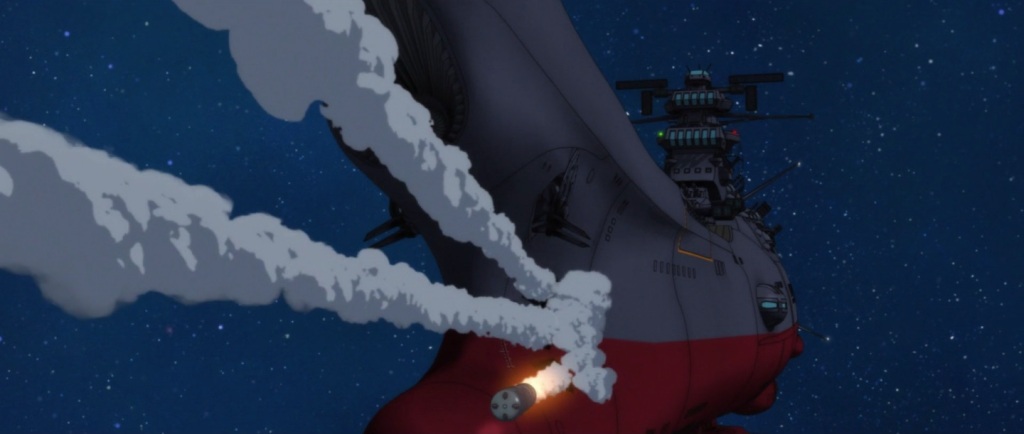
I consider Space Battleship Yamato 2199 to be perhaps the best franchise remake ever. Outside of legacy and possibly 2D vs. 3D animation preference for battles, it improves on the original Space Battleship Yamato in virtually every way. A more interesting and diverse cast of characters, greater complexity in the politics and messages, and a more cohesive narrative all come together with the benefit of decades of hindsight.
Space Battleship 2202 is the direct sequel, and is based on the second TV series, Space Battleship Yamato 2. It centers around the battle against a massive militaristic force from beyond the stars: the highly destructive Gatlantis, also known as the White Comet Empire. Per the title, it takes place three years after the Yamato’s desperate and harrowing voyage to the far-off planet Iscandar to obtain a technology that could restore the Earth’s environment.
Unlike with 2199, I have never seen the Yamato 2, and thus have no direct comparison for what 2202 adds to the story outside of what I can read online. As I started (or rather restarted) 2202, I had my worries. It had been around 10 years since I watched 2199, and due to numerous major world events, my philosophical beliefs have changed in various ways. Given that the series is literally about a gigantic Japanese battleship fighting aliens, might it carry some questionable ideas that I’d notice more easily now? As I kept watching, however, I found that 2202 assuaged these fears. Every time there was something that made me raise a proverbial eyebrow, the series would approach a topic with nuance, give no easy answers, but also criticize outdated ideas about things like race and gender.
The biggest example of the show taking on topics smartly is in its handling of the Wave Motion Gun, the ultra-powerful signature cannon of the Yamato that is capable of devastating entire planets. At the end of 2199, the crew of the Yamato made a promise to Starsha of Iscandar to never use it again. However, the greater Earth forces see things differently, and are revealed to have been building more vessels with Wave Motion Guns. And while the protagonist, Kodai Susumu, believes strongly in their promise to Starsha, keeping it in the face of an overwhelming enemy becomes increasingly difficult—especially when the lives of his allies and their loved ones are at risk. 2022 portrays the fact that this dilemma is anything but black and white, while also pointing out that even if such decisions can be justified, it can still take a mental and emotional toll on those who have to make them.
I also had concerns that Gatlantis, an alien civilization for whom the word “surrender” literally does not exist, might be portrayed as savage barbarians. But when they’re revealed to originally be created as pretty much military livestock—soldiers thrown on the battlefield to keep their masters safe—it’s clear that the Gatlanteans are themselves part of a cycle of victimhood and exploitation that has robbed them of their humanity. And far from treating this as the problems of others, 2202 also shows how the Earth is very capable of making the same terrible moves when they begin developing AI-powered armed forces.
And then, when the show tries to give more background on Desler, the former supreme leader of Gamilas and the main antagonist of 2199, I was worried that it might fall into the trap of redeeming an imperialist dictator just because he had a tragic past. Yet even here, 2202 avoids that pitfall. While we already knew from 2199 that the Gamilas homeworld was dying, we learn that based on the highly racist Gamilan culture (where the pure-blooded rule society under the assumption of inherent superiority), Desler made the decision to become a conquering force for a significant reason: he believed it was the only way his people would accept finding and migrating to another planet. It does not absolve Desler of his crimes, but it has parallels with Susumu’s struggles with whether to use the Wave Motion Gun.
My only complaint about the series is a very biased one: There wasn’t enough Niimi Kaoru, the bespectacled science officer from 2199. She makes a few appearances but is mostly a non-factor, aside from being a small part of a later plot point involving a special battleship and a weird plan to prioritize childbearing women in case of an emergency. Here as well, I was concerned 2022 might be pushing some sexist agenda about the importance of women as mothers, but even that panned out better than I feared.
Space Battleship Yamato 2202 ultimately ends up being a narrative centered around difficult ultimatums. At the same time, however, it also questions why sentient civilizations (whether terrestrial or otherwise) keep putting themselves in situations where people have to make such soul-crushing decisions—might the root causes be matters more systemic? Could something not be done about that instead? Much tragedy could be avoided if we cherished one another’s humanity.